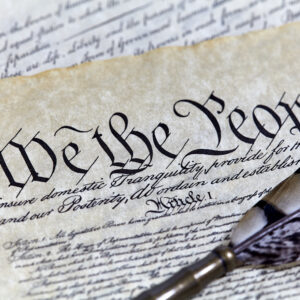The U.S. Constitution was written in 1787 when the country had 13 states all along the East Coast and a population of under 4 million. Can a document crafted entirely by White men in a time when slavery was legal and neither Black men nor any women could vote still be relevant 235 years later?
To detractors, I would argue yes. I would add, in fact, that it may be the most important document produced in the last three centuries.
The Constitution has provided our country with foundational rules and principles, formed the framework of our government, and defined the rights of the people that must be respected.
The Constitution established how the people and the government interact and balanced the rights of the minority with the process of majority rule. It is the foundation of our democratic republic, which John Adams famously described as “a government of laws, not of men.”
The miracle of this document is that its principles and guarantees have continued to shape our lives, protecting our rights to free speech and assembly, providing a structure for our government, and guiding the balance between state and federal governments.
As many of us learned in our early civics classes, the Constitution traces its principles back to 1215 and the Magna Carta, which enshrined the tenet that no one person (man) is above the law.
Recent events help demonstrate the importance of our constitutional guarantees:
—Its critical tenets, such as popular sovereignty, call for the people to establish and empower the government — a critical protection against one person or group taking power and establishing the importance of free and fair elections.
—The Constitution divides the government’s power into three co-equal branches, which hold checks and balances over the others. Throughout history, this has protected the people against government abuse and tyranny.
—The system of federalism outlined in the Constitution balances the rights and powers of every state with those of the national government.
—Its constitutional guarantees for judicial review and independence give courts the authority to strike down laws and actions deemed to not abide by the Constitution.
An attack on the Constitution is an assault on the rule of law. In times of disagreement, the protections of the Constitution become even more important. As former Supreme Court justice Thurgood Marshall warned in a 1989 dissent, “History teaches that grave threats to liberty often come in times of urgency, when constitutional rights seem too extravagant to endure.”
If our government is to be, as Abraham Lincoln proclaimed in his Gettysburg Address, “of the people, by the people, for the people,” then every citizen has the responsibility to pay attention, participate and hold elected officials accountable.
To accomplish this, Americans must become better informed about the Constitution and what it says. Knowing your rights and understanding the constitutional process will make our country more ready to debate the real issues that affect our nation honestly and civilly. Civic knowledge will make us all less susceptible to the demagoguery of misinformation from officials, media outlets and even foreign governments.
As we reflect on the Constitution, we should remember that civics, civility and collaboration — the cornerstones of our democracy — are needed to preserve confidence in our democratic institutions and judicial system and to protect the rule of law. We face a country divided over many issues, and these divisions have roiled our politics. We have experienced decreasing faith in institutions and a growing distrust of one another. We have witnessed attacks on the justice system, the norms of our democracy and the rule of law.
These challenges are aggravated by incivility in public discourse and a general lack of understanding of civics and how the Constitution works.
In this time of division, lawyers need to embrace our role as resolvers of disputes and lead the way in promoting civics, civility and collaboration.
The American Bar Association has the standing, resources and ability to meet these challenges, including collaborative networks of state and local bars, civic organizations and policy tools to lobby for a more just society. We have developed conversation guides for state and local bar associations, and for civic, professional and government organizations to use in developing programs to model civil discourse on hot-button issues. We are featuring civics and civility programming at key ABA events throughout 2023. And are collaborating with other legal organizations on programming and activities.
Civics and civility will also be the focus of national programming and resources developed for the 2023 Law Day, held annually on May 1 to celebrate the rule of law.
As the Preamble to the Constitution reads, “We the People of the United States, in Order to form a more perfect Union, establish Justice, insure domestic Tranquility, provide for the common defense, promote the general Welfare, and secure the Blessings of Liberty to ourselves and our Posterity, do ordain and establish this Constitution for the United States of America.”
We are far from perfect, but we must always strive for perfection if we ever hope to establish true justice and secure the blessings of liberty.


